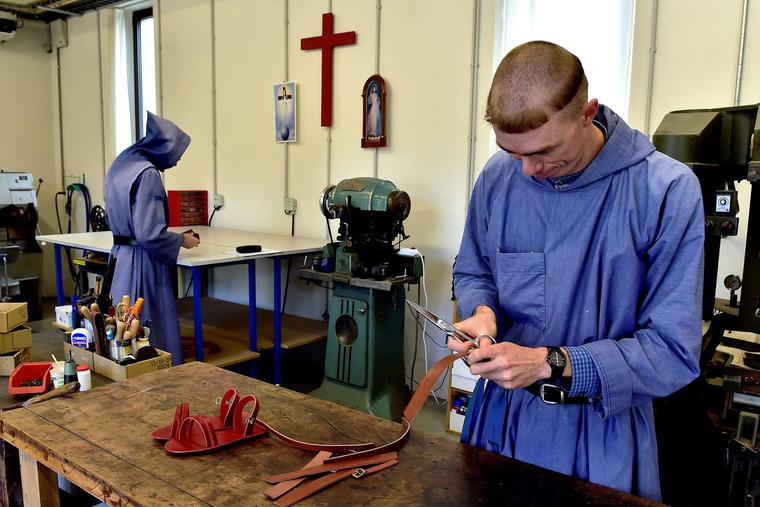‘Whole Self’ Mantra Leaves a Hole in the Heart — Offer Your ‘Holy Self’ at Work
COMMENTARY: The latest human resources buzzword almost gets the spelling right.

There is an à la mode exhortation emanating from corporate Human Resources departments these days: “Bring your whole self to work.”
It is the latest faddish attempt to lure workers back to the office and away from the comforts of home-working.
You know the sort of corporate HR memo involved in this. It urges you to return to “where you know you truly belong,” back to what you know you have been missing these past months. Those open-plan offices where no one can agree on the temperature, but everyone can agree that the customary speech-making on “teamwork” and “leadership” seems endless. To say nothing of the plain old annoyingly human habits of one’s co-workers. Yes, I’m sure you can’t wait to get back to the office.
Okay, I exaggerate — a little.
Seriously, and more worryingly for committed Catholics: there is often a challenge in work environments that no modern HR department wishes even to acknowledge, let alone address. Because it is one that tells you, openly or more subtly, by word or gesture, that “you need to keep your religion to yourself.” If you work here, the unwritten office etiquette is that you need to adhere to what we believe about (fill in the blank).
Long, long ago, in the last century as it happens, in a distant time before the advent of present arguments about so called “woke” issues, I was sitting in a corporate management meeting in London. One manager was making a speech, and it had a clear message. It was summed up in that manager’s last flurry of words: “You can be any religion you want, but keep it out of the office.” And at those last words, she looked straight at me. I had been rumbled. Needless to say, I wasn’t long for that world.
In today’s workplace things appear to have gotten a whole lot worse.
Last month, a Christian teacher was fired from an English school. The reason: he would not call a girl a boy. This is the latest in a long list of Christian professionals who are increasingly no longer tolerated by their employers. Apparently in the world of HR, some beliefs, some minority opinions, and those who hold these “unpopular” views are to command less respect than others.
And yet, this HR fad of bringing one’s “whole self” to work not only persists but appears to be spreading. So, what exactly is it? Over the past 20 years, TED-talker and corporate-consultant Mike Robbins has worked with a wide range of organizations from Google to Citibank, from the U.S. Department of Labor to the San Francisco Giants, and with small start-ups in Silicon Valley. He is author of the 2018 book called Bring Your Whole Self to Work: How Vulnerability Unlocks Creativity, Connection, and Performance, in which he says this bringing of the “whole self” means being able to fully show up and allow ourselves to be truly seen in the workplace. According to Robbins, such a showing is essential to create a work environment where people feel safe enough to bring all of who they are to work.
To my mind, this “whole self” already has a number of aliases — it is also termed the “authentic self” or “the real me.” You get the picture, one that has the words “me” and “self” predominating. Ours is definitely not an age that sees any value in self-effacement. No, instead, the time has come for the “whole you” and, by extension, the “real you” — the bright luminous you, reflected in the glory of your mirror at home — to come to the office.
Having been both an employee and a manager of employees, I can assure you that no office could cope in this HR elysian realm of self-realization where everyone’s “whole self” materialized. That is because offices and workplaces are there for one primary purpose — namely, to complete work. The clue is in the title: workplace. Contrary to what some suggest, especially in Silicon Valley, the office is not a “play area,” nor a “self-actualization zone.” Instead, any office is there to ensure the optimum environment for the completion of the work that employees are paid to do. Simply put, that is why offices exist. Anything else, be it social, therapeutic, holistic or even transcendent, is merely an accident.
At the very least, the employee is there to work, which answers the question as to who it is the employer would like to show up at the workplace. Your best self, that is who — someone who is professional, focused on the task at hand and with the requisite skills necessary to complete the task. Preferably this work should be carried out in a manner that is timely and brings credit to one’s employer. It might be good to remind the mythic “whole self” who pays the wages in the real world.
Labor and capital have always needed each other. This is how the working world has spun round since the days of old. But the current revolution in today’s workplace (of which this “whole self” trend is yet another example) keeps spinning around things far removed from this self-evident fact — namely, that you get paid for the work you do, and that is why you are there. Instead, we continue to debate subjects that ultimately substitute the objective nature of a workplace for a subjective one centered on the employee.
In the pages of Sacred Scripture, and central to Christian moral teaching about the workplace, there is the idea of doing an honest day’s work for an honest day’s wage. The simple model of labor proposed is that the exchange between employer and employee is agreed in advance and that, upon that work being completed, remuneration is swiftly given. This principle of Catholic Social Teaching, one based explicitly in Scripture, requires employers not to exploit workers but to pay them a just wage. Equally, though, it obligates employees to meet their obligations honestly.
The workplace was, and still is, the venue for this exchange to take place — nothing more. The real worth of any work undertaken is measured not by where it takes place, nor by which “self” turns up to do it. That is because work has an intrinsic value. It is part of God’s plan for each of us. In one’s vocation, a sense of dignity is conferred by doing honest work. Of course, such work will have always a financial dimension, but it is not the only one. Our labors also give glory to God.
In light of this Christian understanding of work, debates about the “whole self” in the workplace sound ridiculous. For as any Christian knows, you should always bring one’s full focus and concentration to any professional work undertaken each and every day. Viewed through the prism of one’s vocation, that working self, by the grace of God, can bring about a soul that is holy — a much more whole version of who we are than any of us could ask or imagine.















